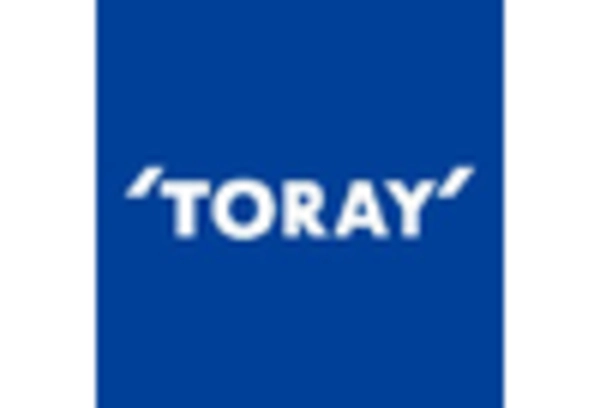The composite repair market in South Korea is characterized by a dynamic competitive landscape, driven by technological advancements and increasing demand across various sectors, including aerospace, automotive, and construction. Key players such as Hexcel (US), Toray Industries (JP), and Sika AG (CH) are strategically positioned to leverage their innovative capabilities and extensive product portfolios. These companies focus on enhancing their operational efficiencies through digital transformation and strategic partnerships, which collectively shape a competitive environment that is increasingly reliant on advanced materials and repair technologies.In terms of business tactics, companies are localizing manufacturing to reduce lead times and optimize supply chains, which is crucial in a market that appears moderately fragmented. The competitive structure is influenced by the presence of both established players and emerging firms, creating a landscape where collaboration and innovation are essential for maintaining market share. The collective influence of these key players fosters a robust ecosystem that encourages continuous improvement and adaptation to market demands.
In October Hexcel (US) announced a partnership with a leading South Korean aerospace manufacturer to develop advanced composite repair solutions tailored for the region's growing aviation sector. This strategic move is likely to enhance Hexcel's market presence and align its offerings with local industry needs, thereby reinforcing its competitive edge in a rapidly evolving market.
In September Toray Industries (JP) launched a new line of eco-friendly composite repair materials designed to meet stringent environmental regulations. This initiative not only underscores Toray's commitment to sustainability but also positions the company favorably among environmentally conscious consumers and businesses, potentially increasing its market share in the eco-sensitive segments of the composite repair market.
In August Sika AG (CH) expanded its operations in South Korea by establishing a new manufacturing facility dedicated to composite repair products. This expansion is indicative of Sika's long-term strategy to enhance its production capabilities and respond to the increasing demand for high-performance repair solutions in the region. Such investments are likely to bolster Sika's competitive position and facilitate quicker response times to market fluctuations.
As of November current trends in the composite repair market are heavily influenced by digitalization, sustainability, and the integration of artificial intelligence. Strategic alliances among key players are shaping the landscape, fostering innovation and enhancing product offerings. The competitive differentiation is expected to evolve from traditional price-based competition towards a focus on technological advancements, innovation, and supply chain reliability, indicating a shift in how companies will compete in the future.
















